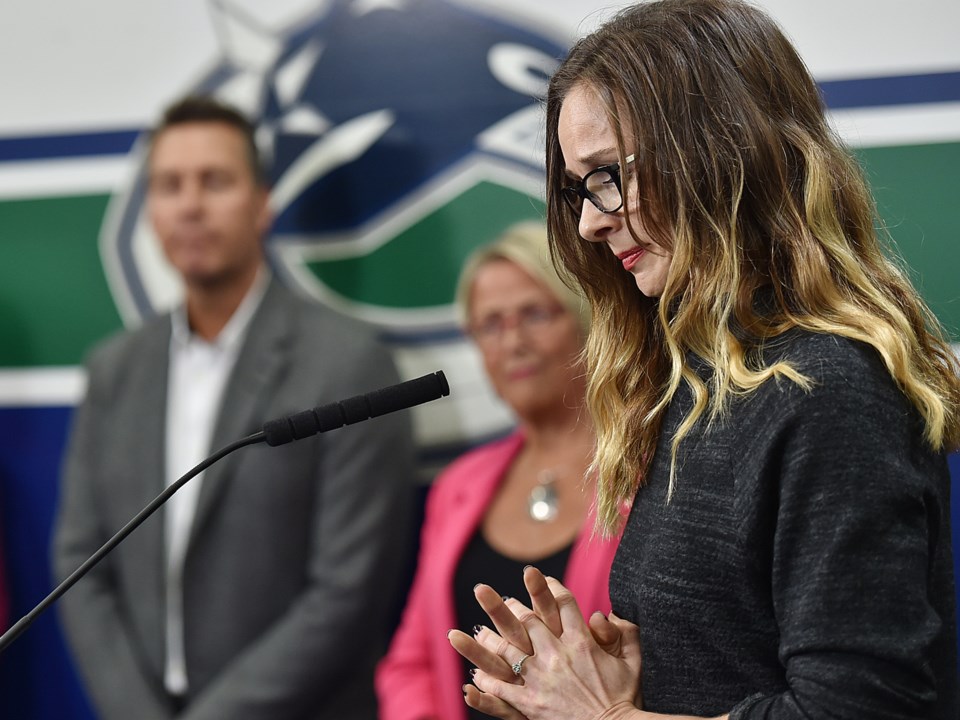Stephanie McCune didn’t think she’d be spending a Monday afternoon watching a Vancouver Canucks practice with politicians, police and paramedics.
But it was her brother, Michael, who brought her there.
He died alone Nov. 22, 2017 of a “fentanyl poisoning.”
She wanted to talk about him, his addiction and how -- more than ever -- people have to reach out to people living with addictions and mental illness to bring them out of the shadows. McCune wants such social issues to be part of everyday conversations.
So, prior to practice, McCune joined Judy Darcy, the Minister of Mental Health and Addictions, and former Canucks goalie Kirk McLean in the hockey team’s media room to launch a public awareness campaign. She spoke to an audience that included paramedics, police, doctors, drug policy experts and operators of drug consumption sites.
“[My brother] was a father, a son, a grandson and a friend,” said McCune, her voice breaking. “My brother was a kind, gentle and loving soul. He was a listener and a helper, open and generous. And although his family knew his many beautiful qualities, stigma had convinced him otherwise.”
Stigma, she said, erodes relationships, “perpetuates practices of silence and isolation, performs secrecy and creates conditions of shame, blame, fear and guilt.” She said compassion and inclusion can counter those feelings.
That’s why she supports the province-wide campaign that will feature ads on television, online and social media, as well as high-visibility public billboards to be rolled out in the coming months. The Canucks will display posters and ads throughout Rogers Arena during games. The ads will also be displayed during concerts.
“There are efforts we can do as individuals but unless those efforts are built on a foundation of a societal response, I think the challenge continues,” McCune said. “So we need a much broader collective effort that supports the individual effort.”
Kirk McLean, a former Canucks goalie, is acting as ambassador to the campaign and spoke at the news conference about three former teammates who battled addiction and mental health issues. He didn’t name them but said he’s glad they’re still alive.
“They’re on the road to recovery, or are recovering, and are doing very well,” he said. “It’s my hope that you join me and become a change-maker by having an honest conversation with a friend, co-worker or a loved one about substance use and addiction.”
McLean said there is a “human face” to the crisis, with many of those living with an addiction and mental illness the same people who support the Canucks. So, he added, it made perfect sense for the organization to be involved in the project.
Darcy shared that her mother struggled with addiction and mental health issues all of her adult life, pointing out there is no one stereotype of people dealing with such serious conditions. Addiction affects people from all walks of life, she said.
“In addition to struggling with addiction, they also have to deal with fear – fear of speaking out and saying that they have a problem because of stigma,” Darcy said. “So they struggle in silence. We have to knock down those walls of silence, so that people are not afraid to talk about substance use and addiction – so they aren’t ashamed to reach out for help.”
By visiting the campaign’s website (StopOverdoseBC.ca), people can access information on how to have “courageous conversations” with loved ones struggling with substance use, where to go for treatment and other services.
“It is a call to action for us to stop seeing addiction as a moral failing, and to start seeing it as the health issue that it is – so that people living with addiction receive the same dignity, the same respect and the same quality of care as people who are dealing with any other kind of illness,” Darcy said of the campaign.
More than 1,200 people died of a drug overdose in B.C. in the first 10 months of last year. The BC Coroners Service is expected to update the death toll Wednesday with the release of statistics for November and December.
@Howellings



